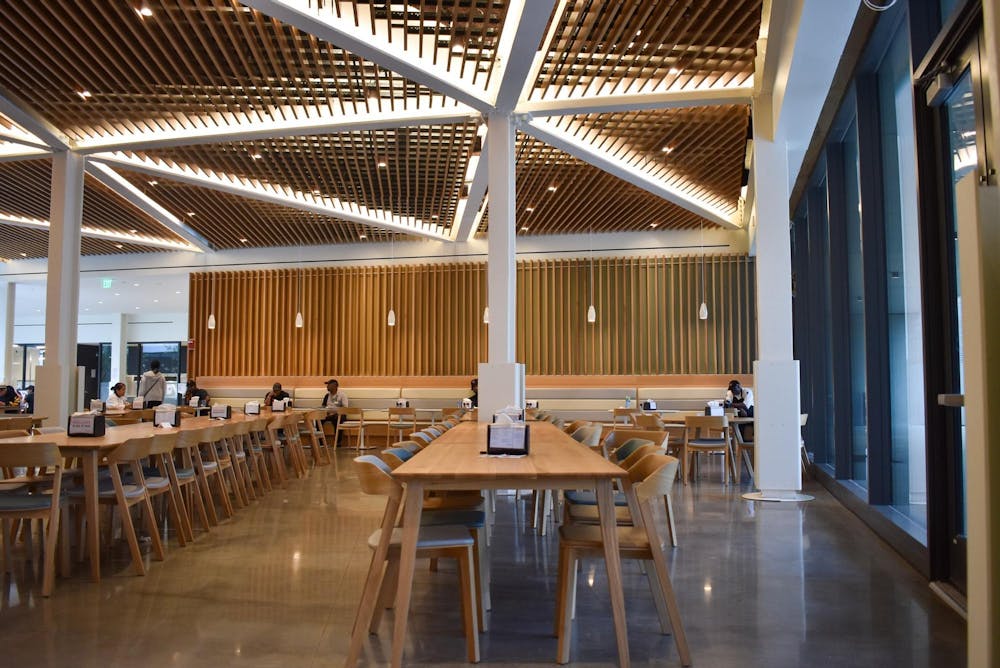Some of Princeton’s staff and facilities workers have worked at Princeton for longer than we’ve had the African American studies major and the Princeton Neuroscience Institute. Some have seen almost twenty graduating classes pass through this university. And some have been at the institution almost as long as I’ve been alive! There are too many members of staff that fit these categories to even begin to name them.
However, unlike the faculty and teaching staff who we students engage with in the classroom and through academic work, many of us don’t know most of these staff members, even though we see them on a daily basis. So how did I learn about them? Yeh College and New College West have taken a small but significant step towards introducing the dining hall and facilities workers who are so critical to our lives and communities by highlighting them on posters around the building. I argue that every residential college should start this, and then every residential college should go further in helping us students get to know the staff.
This is so important because community extends outside the classroom: non-teaching employees play a huge part in establishing community and spaces of belonging at the institution. Esther, who was a Whitman dining hall staff member at that time and now works in Yeh/NCW, once told me it was her goal to learn all Whitman college students’ names within the first two days of the semester. This directly affected me — Esther always called me by my name and spoke to me in Spanish. As an underclass student who lived in Whitman, it always made me happy to talk to Whitman dining hall workers — who often greeted me by name — especially on days where I felt most homesick.
Although it is harder to know a facilities member or dining hall worker as intimately as you would know a professor who holds office hours and writes you letters of recommendation, it is no less important for students to feel connected to non-teaching staff. These connections ensure that we and the staff all have positive experiences at Princeton, and that we can all feel we belong to Princeton’s community.
Beyond being dining hall workers, janitorial staff, facilities workers, etc., staff members are also people who have lived and worked in our community for many years, sometimes much longer than the time a single student spends at Princeton. Learning even very small pieces of information about staff members, such as how long they’ve worked at Princeton or what they like to do in their free time, can help staff members feel more valued by the community.
Without non-teaching staff, the campus community would not feel as cohesive as a self-contained “Orange Bubble.” Princeton would be an entirely different place for me if I didn’t say hello to Dave, one of Whitman’s staff members, every time I saw him on campus; Or if I wasn’t often greeted with a big smile from Mia, who works in Firestone’s Tiger Tea Room; Or if I didn’t know Whitman dining hall staff members well enough, even now, to know who will speak to me in Spanish, or who gets the weekends off, or who makes the chicken pot pies every other Wednesday. I’m eternally grateful for the ways that they show us students love every single day.
Research shows that relationships with staff members have proven integral to students’ feelings of belonging. In one study, students reported feeling seen by dining and other non-academic staff, leading researchers to conclude that these staff “are well positioned to facilitate a sense of institutional connectedness.” Stronger relationships with staff will benefit staff, students, and the entire residential community.
While it would be ideal for students to know as much as possible about non-teaching staff members, this is not a small feat. It requires students and staff to spend a lot of time together. However, if students knew at least a little bit about non-teaching staff members, it would greatly improve how the staff are treated and make our entire Princeton community stronger and more inclusive.

To achieve this, every residential college should follow the Yeh/NCW precedent and make information about their staff available to students both in the dining halls and online. And that approach should expand: Residential colleges should create new displays that prompt staff with questions that are aimed at improving their experience at Princeton, such as: what is one thing a student could do to make you smile? What makes your day? What is one thing you wish every Princeton student knew? What’s your biggest pet peeve about Princeton students? How do you hope to build community?
Students, for their part, should listen up and then follow through, implementing any suggestions they receive from these prospective displays. It’s students’ responsibility to treat non-teaching staff members with respect. These staff members care about our health and wellbeing and continue to work to make Princeton a place we not only love and are happy to live in, but a place we continue to come back to years after graduating. Learning about these staff members and treating them well is the least we can do to reflect the gratitude we feel for the very important role they play in our community. We can start by giving them a platform to tell us how to make them feel valued.
Asa Santos is a senior majoring in Anthropology from London and São Paulo, minoring in Gender & Sexuality Studies and Global Health & Health Policy. Santos’ column, “Opening the Gates,” runs every two weeks on Tuesdays. All of their columns can be read here.









